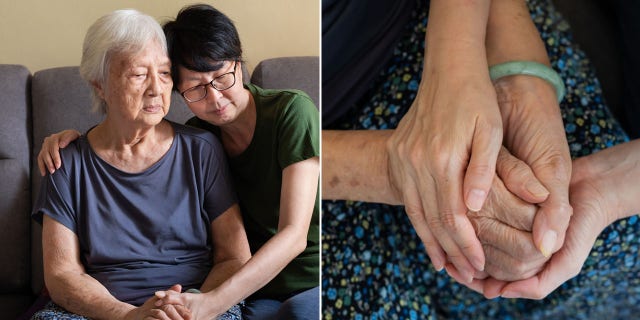
The number of people serving as sole caregivers for other adults is growing.
In 2020, 53 million people in the U.S. provided unpaid care to an adult, according to the National Alliance for Caregiving (NAC), based in Washington, D.C.
Caregiving duties can include bathing, grooming, administering medications and providing emotional support, as well as day-to-day functions such as shopping, cooking, cleaning and transportation.
MOM WITH MS LEANS ON HER SON, A TEENAGER, FOR CAREGIVING
While caring for loved ones can be personally rewarding, it can also be a source of significant stress.
Nearly 15% of caregivers reported having 14 or more mentally unhealthy days in the past month, according to a survey sent by the Centers for Disease Control and Prevention (CDC) between 2015 and 2017.
Kiera Powell, a registered nurse from Charlotte, North Carolina, said caregiving can be especially stressful when the caregiver is overseeing a loved one — and has no training.

Nearly 15% of caregivers reported having 14 or more mentally unhealthy days in the past month, said a survey from the Centers for Disease Control and Prevention. Caregiving can be rewarding but also stressful. (iStock)
“Many caregivers provide full-time care to a loved one without support, and the emotional and physical strain they experience can result in exhaustion and burnout,” she told Fox News Digital in an email.
Women are particularly susceptible to caregiver stress, according to the Office on Women’s Health.
Signs of caregiver stress need to be recognized
Common signs that caregiver stress is taking a toll include continuous fatigue, lack of motivation, irritability, changes in sleep patterns and frequent feelings of sadness and worry, said Powell, who works with Carewell, an online platform that provides caregivers with home care products, support and educational resources.
Women are particularly susceptible to caregiver stress.
Stressed caregivers may also notice weight gain or loss, a lack of interest in activities they once enjoyed, or frequent headaches or bodily pain, per the CDC.
They may also be more susceptible to abusing alcohol or drugs.

In 2020, 53 million people in the U.S. provided unpaid care to an adult, according to the National Alliance for Caregiving (NAC). (iStock)
Caregivers can also tend to neglect their own health needs, which can increase their chances of developing chronic medical conditions.
Acceptance is key to stress relief
Caregivers should focus on accepting that there are certain things they can’t do and can’t control, Powell told Fox News Digital.
“As a caregiver or health care provider, you always want to go above and beyond for the person you care for, but sometimes you can’t,” she said. “Recognizing when that isn’t possible may save unneeded stress.”
CAREGIVING FOR A SPOUSE DURING GOOD TIMES AND BAD: ONE MILITARY MAN’S INCREDIBLE STORY
Along those same lines, Powell warned against taking things personally in the event that something goes wrong.
“Forgive yourself and your care recipient often.”
“Instead, forgive yourself and your care recipient often,” she advised. “Letting things go will help you carry less stress with you.”
Take time for breaks
Caregiving can often feel like an “always-on” job, which can quickly lead to burnout.
Powell said taking breaks is an essential tactic for managing stress. In the short term, do small things that bring joy, she recommended.

“Many caregivers provide full-time care to a loved one without support — and the emotional and physical strain they experience can result in exhaustion and burnout,” a nurse told Fox News Digital. (iStock)
“Whether it’s getting a pedicure, watching your guilty-pleasure reality show or going to the grocery store alone for needed ‘me’ time, do something that makes you happy at least once a week,” Powell suggested.
For more intentional breaks, she recommends looking into respite care, which is a short-term service that provides relief for primary caregivers.
CLICK HERE TO SIGN UP FOR OUR HEALTH NEWSLETTER
“This can range from a few hours of relief from their duties to a week or two,” Powell said.
“Try journaling daily to help you process your feelings.”
“It can be done in the comfort of your home, at an assisted living facility or at an adult day care.”
When a caregiver is feeling stressed or overwhelmed, she said it’s important to express those feelings to someone.
CLICK HERE TO GET THE FOX NEWS APP
“Verbalizing your emotions can be therapeutic and can help cleanse your mind of everything you’ve been holding in,” Powell said. “If you don’t have someone you can talk to, try journaling daily to help you process your feelings.”
To read more pieces in Fox News Digital’s “Be Well” series, click here.

 Latest Breaking News Online News Portal
Latest Breaking News Online News Portal




